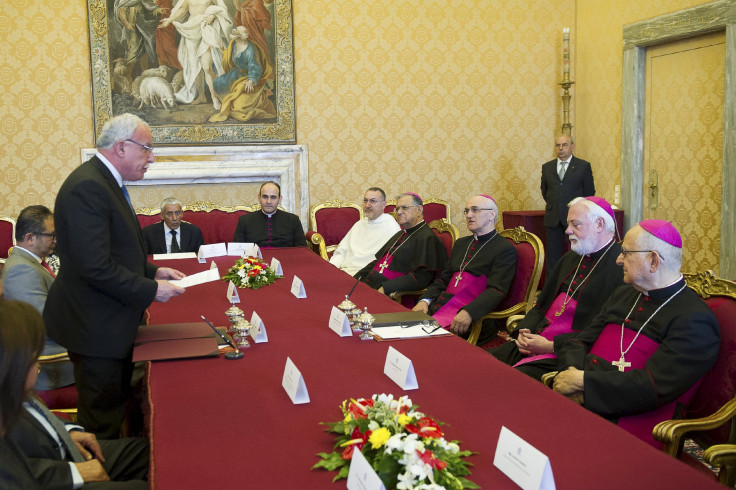Vatican Signs Historic Treaty With State Of Palestine, Angers Israel

The Vatican signed its first treaty with Palestine on Friday, officially recognizing the state in hopes the legal recognition would spur Israel to work with Palestine to forge a two-state solution, reports Reuters.
Paul Gallagher, the British archbishop who serves as the Vatican’s foreign minister, signed the treaty with Palestinian Foreign Minister Riad al-Maliki, inside the Vatican. The treaty formalized the Vatican’s tacit recognition of Palestine as a state, its stance since 2013.
Al-Maliki said at the signing ceremony the agreement “would not have been possible without the blessing of His Holiness Pope Francis for our efforts to reach it.”
The treaty was signed by Gallagher on behalf of the Holy See. Guests witnessing the event included Vera Baboun, who serves as the mayor of Bethlehem.
Israel did not respond favorably to the action, saying in a statement that the treaty was "a hasty step (that) damages the prospects for advancing a peace agreement.” Israel also warned that the treaty could have negative “implications for future cooperation between Israel and the Vatican.”
The agreement has been some 15 years in the making and was finalized last month but promptly condemned by Israel as a roadblock to the peace process.
But the Vatican is holding firm and hoping that the move will serve as a model for Arab and Muslim states in their response to increasing persecution of Christian minorities across the Middle East.
"In this context, it is my hope that the present agreement may in some way be a stimulus to bringing a definitive end to the long-standing Israeli-Palestinian conflict, which continues to cause suffering for both Parties. I also hope that the much desired two-State solution may become a reality as soon as possible. The peace process can move forward only if it is directly negotiated between the parties, with the support of the international community," Gallagher said. "This certainly requires courageous decisions, but it will also offer a major contribution to peace and stability in the region."
© Copyright IBTimes 2024. All rights reserved.





















